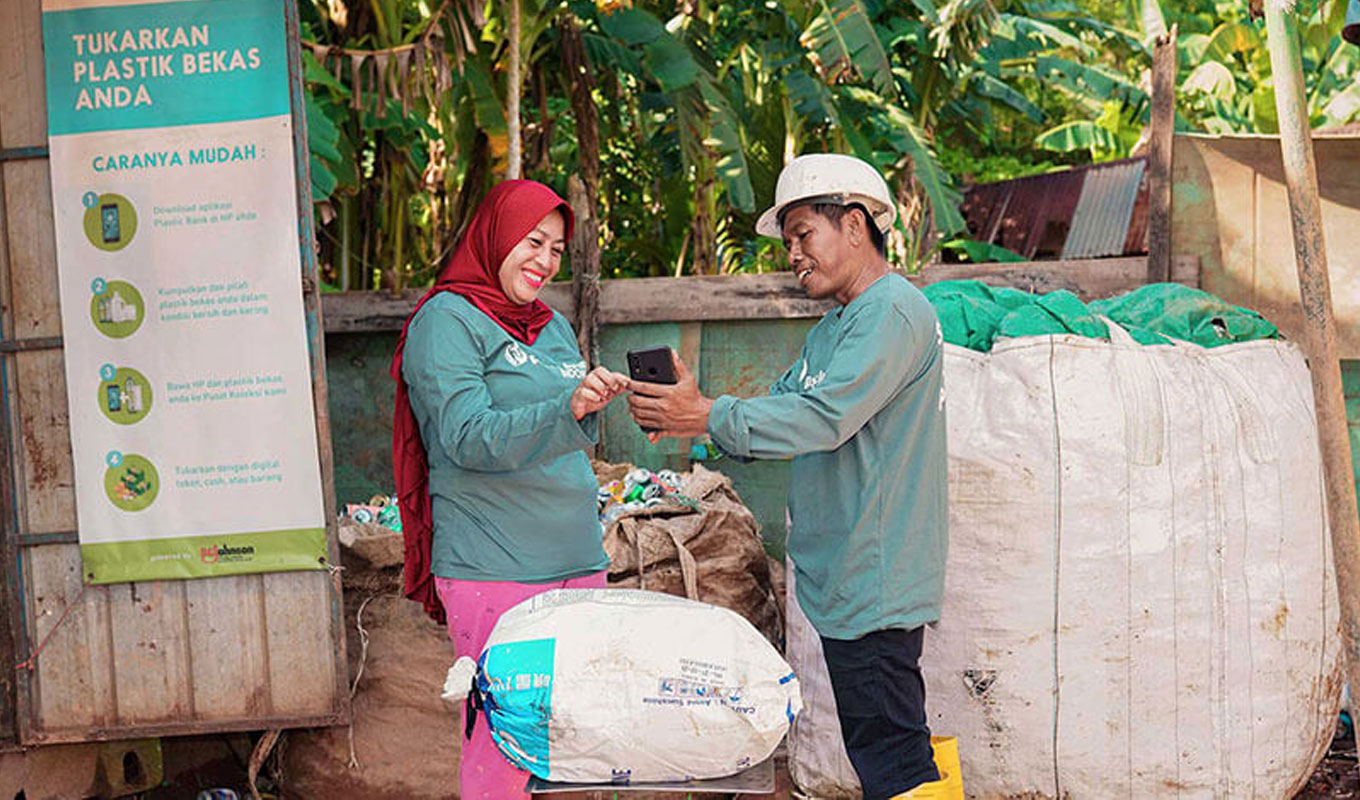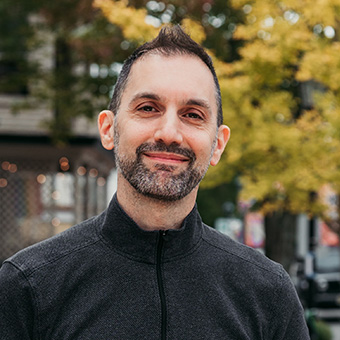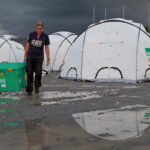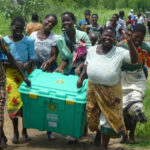
Plastic Bank
Podcast: Play in new window | Download
Growing up on Vancouver Island in British Columbia, Canada, the beach was David Katz’s playground; and his father, a merchant marine and craftsman, would take the young David on adventures out to sea. This upbringing instilled in him a love of the ocean and the precious beauty of nature. But as time passed, David noticed a growing problem – the constant flow of plastics and trash washing up on the shores. With the passion passed down from his father, and a natural tack towards problem solving, David decided to take matters into his own hands. He developed a plan to not just clean the beaches, but also to lift millions of people from poverty at the same time.
LINKS:
- Plastic Bank website
- A TED Talk with founder David Katz
- Turning the tide on waste with Shell
- Blockchain-based solution with IBM
- Partnership with product giant Henkel
- Environmental Stewardship with SC Johnson
Full Transcript
Chris Straigis – 0:02
From AAC Studios, welcome to Scrappy, the podcast about small companies doing big things. I’m your host, Chris Straigis.
Chris Straigis – 0:16
Plastic is truly a game changing material. It has taken on infinite shapes and properties, and shown up in just about every corner of our lives. In fact, our modern world might not be nearly as advanced without its development. It’s inexpensive, it’s easy to produce, and it’s durable – It lasts a long time. But that durability is also one of the biggest problems with plastic. Once it’s made, it doesn’t really go away. It doesn’t dissolve, it’s not biodegradable; it will long outlive all of us. And unfortunately, an incredible amount of that long-lasting, man-made material is ending up in the world’s oceans and waterways. This is literally decimating plant and animal life and changing entire ecosystems. This is a big, complex global problem. But sometimes to solve a big complex problem, you need someone to see things from a different perspective.
Chris Straigis – 1:23
Today we’re talking to David Katz, founder and CEO of Plastic Bank. They’re an economic development firm that empowers disenfranchised communities by letting them exchange any type of plastic… for currency. His unique strategy solves two problems at once. It creates revenue in otherwise impoverished communities. And it helps clean up the plastic pollution that’s overtaking our seas. David grew up on Vancouver Island, Canada. As you might imagine, for someone who was raised surrounded by water, his love for the ocean sparked at a very young age. And that love was stoked by his father, a merchant marine, who taught David about a lot more than just fishing.
David Katz – 2:15
The family house was across the street from the beach, it was always my playground and on the way to school, I also walked along about a half mile long beach to get to school. I did that for a decade or so. And even as a kid as I walked that beach, play to the beach and walked it. Part of this story really is about those times because I was able to then as well witness garbage washing up on the beach.
David Katz – 2:47
So it’s been in my realm decades longer than most. My father was a mariner as well, he was Merchant Marine. And even in my youth as well, my father, the mechanical genius that he was, built a 47 foot sailboat from the hull up, by himself. And then sailed that to, you know, the very southern tips of Mexico, mostly by himself, but I joined him in that journey as well, sailing the ocean and encountering all the life that we would have encountered and, and then sailing back up, back up to the west coast of Canada. So that journey, of course, was a part of it. My parents were entrepreneurs, immigrants and entrepreneurs. And even as a child, you know, I attribute much of my creativity and entrepreneurship to a spark that my brother gave me when I was like 10.
David Katz – 3:38
We had this family business and he had these other ideas and like, oh, well, we could do this, and we could do that. Or we could open a poster store, which was really big when I was a child. And I was just, I was like, yes, of course, we can do that, that’s amazing. That sounds like a sense of freedom and creativity. And that was the spark. It was the new awareness that it became a possibility that even if could be… And I think that much of what we do in the Plastic Bank is a reflection of that as well. Where many people want to stand up and make a change in the ocean but don’t know how. And this is an opportunity for them to as well be a part of that change. And I really, I think that part of the conversation with everyone is that we’re the summation of all of our experiences and all of our decisions. We are today where we are as a result of everything that we have ever encountered.
Chris Straigis – 4:39
Of course, taking measures to protect the Earth with better waste management is nothing new. We’ve been recycling for decades, and more recent pushes like banning single use plastic bags or restaurants eliminating plastic straws have gained a lot of attention. But there’s an important distinction between these type of actions which address singular products and Plastic Bank’s purpose, which addresses greater societal dilemmas across the globe. David recognized early on that problems with plastics are much more acute, much more detrimental and much harder to address in some of the most socio-economically underdeveloped parts of the world. And he realize that this could be a two birds one stone kind of solution.
David Katz – 5:30
Straw bands are beautiful. Those are really nice. Not the issue, right? That’s not the cause of things. It’s nice, it’s good, it’s important. All those things are important. Poverty is the issue. A lack of opportunity, is the issue.
Chris Straigis – 5:41
David’s idea was unique because it wasn’t just about cleaning up the environment. Instead, it was about creating a new mindset and motivation around recycling and the opportunities that could unlock.
David Katz – 5:58
I think what I’m doing is easy in comparison, because nothing I’m doing is against the laws of physics. I don’t have to play with physics to figure it out. We could say the change of thinking sometimes it may be greater than the change of physics. But in this context, it’s really about not convincing anyone against their will to do anything. It’s really this transformative opportunity where within the collection communities, they see something that’s in it for them. We don’t have to teach them about recycling. They’re already creative and resourceful.
David Katz – 6:28
Now, in my experience, when I had the idea, which was May the 11th 2013, I was at a learning event in Silicon Valley, that thing called Singularity University. And then Singularity University, they express great new emerging technologies and things that are going to be changing the world and these base pyramid challenges. And one of the seminars was about additive manufacturing or what we called 3D printing. Avi Reichental, was the CEO of 3D Systems at the time, the first publicly traded company focused on 3D printing, and he was speaking and as part of the examples that he brought to exhibit the power of it. He had this big brown belt, it was a plastic belt, of course. It was manufactured out of one long single strand of plastic. Just using a nozzle and moving the nozzle to determine shape. I asked what was the sale price of the item – $80 was the response. And when I asked what the cost was – $10 was the response. And in that moment, the birth of the Plastic Bank occurred.
David Katz – 7:37
What I determined was that it was only the shape of the plastic that determine the margin, the markup and the value. It was still plastic, it was just a shape. Just like if you go buy a piece of plastic for your car, it could be hundreds of dollars – the value of the material, maybe pennies. The shape determined the price. So perhaps inside of that I thought could be the nucleus for change. If I could not maybe change the physical shape on the outside, but change the value perception inside the mind. That can be the change. You know, some of the powerful conversations I have, and I’ll ask you, if every bottle or every piece of packaging that you saw was worth $5 US dollars, how many would you leave on the ground? So it’s not the plastic, it’s us in the way we view it. And that is the origin of the Plastic Bank. The name itself implying the value, bankable, valuable, to be steward to be cared for.
David Katz – 8:50
One of the people that I met at Singularity University, was an industrialist in Peru. When I had the idea I shared it with with him, we became nice friends. Inspired by the idea, he is well agreed that it should be a success and he said ‘David come to Peru will fund you, everything will be great.’ He’s, you know a fellow who owns Peru Rail and all, and I thought ‘wow how how beautiful – we’ll go to Peru will launch, Lorenzo is there, we’ll be funded, it’s going to be great!’ Well, of course we agreed to go, we hired some staff we thought we’ll launch. Well of course we get to Peru, no Lorenzo. Lorenzo is not answering any of my calls anymore. So we we struggled and and had to learn what not to do. But it gave us great insight. As everything is back to the knowing that we are the product of the decisions and experiences of our lives. When we can view them and say where is the gift inside of this? We have the ability to continue to transcend and move forward, and no matter what you encounter, takes you to the destination that you’re standing forward for. And, and much of that as the philosophy of my life.
David Katz – 10:17
It was this sense of open mindedness, this awareness of big picture that David has always carried with him in his travels. And, and one of his trips to South America, he recognized Peru is one area of the world that is unfortunately the starting point for a lot of the plastic and waste flowing into the ocean. that’s largely because of the existing infrastructure for recycling.
David Katz – 10:41
Peru is a great leacher of plastic in the ocean, all of Latin America is. And not always this the biggest city, but those that live up river that have no solid waste management at all. And I have witnessed, as it is witnessed around the world, that in the middle of this town or city is a dumptruck – everyone throws their garbage in the dump truck, it drives up to the river and dumps it in the river. So the question then is how might we prohibit the flow of plastic from entering into the ocean to begin with? Okay, when we look at that we go okay, well, how might we keep them from throwing it in the river? Okay, well, why they throwing the river? There’s no other other opportunity. Well, where there’s no other opportunity, why is there no other opportunity? Well, there’s no money. So it’s a cause? Oh, hold on a second – how do we make it revenue? The poor don’t throw away cash.
David Katz – 11:27
The gears started to turn in David’s head as he realized the solution to the problem might lie simply in flipping that switch. But he had to grapple with just how big his idea was.
David Katz – 11:39
When I had that idea, that May the 11th, the enormity of it, it was such a big idea. It was so terrifying at the same time, I thought ‘oh, my goodness, this could be this could be it for the world. No one will throw away cash. How might we be able to turn plastic into money for the world so it’s never thrown away? That can be it. Oh my goodness.’ And then of course, the flood of ‘I’m gonna go and create a new, you know, supply chain of materials to the biggest brands in the world. I’m gonna have to go sell to the biggest brands in the world, I’m going to go have to create infrastructure within extreme poverty and scarcity and violence and, and, in the story and I’m how to connect the world and the consumer – what an overwhelm.’ Then of course, the first thing that went through my head was ‘oh, I can’t do that, that’s too big.’ And then the very next second I had a moment of consciousness. I had someone whisper thatDavid, you don’t need to be the person that could do that. You only need to become the person that can.
David Katz – 12:43
David describes Plastic Bank as the Airbnb of recycling – a digital platform that provides a system for people to create a recycling infrastructure wherever they are. Plastic Bank’s technology works across a few different models. One interesting example is within congregations – churches, mosques and other places of worship. These can become collection locations for their communities. Along with bringing an offering members can also bring their recycling.
David Katz – 13:14
I’m most proud, I mean, all the staff have their their beauty inside of it. But this this interfaith model… I mean we’re really needing to build the world’s largest recycling organization without owning anything. One of those models is within congregations, so that within churches or mosques or wherever you may find your sense of spirituality, and wherever you may be in tithing or bringing of service or gift to the poor or to the world, instead of just bringing an offering on your day of worship, you bring your recycling with you as well. And that becomes a collection, collection location and an opportunity to be engaged in the stewardship over the earth and the poor as well. And remember, when we alleviate poverty, we also alleviate many of the environmental concerns. And I’ll be in the expression that poverty, the element of poverty that we need to serve the most as poverty of the soul. And most people still believe that a lack of material wealth is poverty. And that is not the case.
Chris Straigis – 14:14
By harnessing that sense of community spirit, Plastic Bank has been able to make an impact on a global level, not just in single cities or countries.
David Katz – 14:24
When we alleviate poverty of the soul, then we’ve got a great paradigm as well, that can also bring a level of consciousness, gift, love, service, and everything else that the world is so hungry for. So we solve a lot of problems. We’re gathering the world together, it’s a core value of the company ‘gather together.’ It’s not about us gathering every human of course, we want to, but it’s about gathering companies that then can gather others. Really our model is it unfolds in front of us is we create cooperatives. Our most powerful models around the world, like one of our recent ones in Naga City in the Philippines, we took 176 individual collectors – what other people were calling waste pickers – collectors, entrepreneurs, that were all individuals collecting material and then selling it to a middleman. Well, we came in with the work of the city, we created a set of bylaws, and we created a cooperative where a president is appointed, voted for, the board is voted for, and we give them a physical location. And just in that very action, they were able to remove the middleman and they doubled their income. We took 176, mostly women, and doubled their income overnight.
David Katz – 15:42
And you visit, they have tears in their eyes for the impact that it’s created. Now in that as well, they also created a little daycare so that many of them could work while the children were taken care of. They created the savings and investment group. When we took people who didn’t have enough money for the rest of the day, and now they have savings and an investments.
David Katz – 16:02
What really drives the success of Plastic Bank’s model is a combination of conscious capitalism, and what David refers to as ‘winning to the sixth power.’
David Katz – 16:13
Well, here’s the thing, I say this all the time and I love it – everyone has a favorite radio station, It’s WII FM – ‘what’s in it for me.’ And so when there’s a what’s in it for me, awesome. And the beauty of what we do within the conscious capitalism movement, it’s called a win of the six power, win, win, win, win win. Maybe I missed a win in there, but better. And, and it’s to the six power so it’s like exponential, so that everybody wins, and your success develops my success, my success, our success then develops the next person success. And even with us, the plastic wins because it becomes new again. Nothing loses with us. It’s so powerful. It’s so beautiful. It’s so important for the world, just the thinking is important for the world. If all we did was bring a new way of thought, and a new way of being, that would be enough.
David Katz – 17:17
We don’t sell recycled plastic or virgin plastic, we sell social . We have our own category of material. And that material has a value that transfers itself into the lives of people who encounter it. So we don’t necessarily compete against the traditional pricing models. Now as well, just to be in reference there, it’s not that the China has turned down as well, that’s not the case with China. What China decided to do was stop taking other people’s garbage. So they’re hungry for pelletize material. They’re hungry for raw material. But then what they don’t want to have happen is people sending in their their crap.
David Katz – 17:52
In truth, it’s not just underdeveloped countries that are struggling. With the traditional models of recycling, even here in the States, the old models are breaking down, and we’re starting to see some major shifts in recycling. The type of plastic used to make milk and detergent bottles, for example, is currently bringing only about a third of the price that it did from just a couple of years ago, which makes it a much harder business model to sustain. This has a lot to do with what local municipalities and governments are doing with the collective recycle material to get more value out of it. Plastic Bank’s goal is to make sure that they’re creating as much value as possible to open up those wider opportunities and enrich the lives of all those taking part in the mission as well.
David Katz – 18:44
The gifts in what we do as well is we get to ship material when there’s a purchase order, so we’re not necessarily just shipping garbage, we’re shipping a raw material that we flake the material or hot wash it sometimes pelletize it. We work with the local infrastructure to add as much value in country as possible. It’s an ecosystem. So everyone that participates, makes a profound difference. And one of the gifts of what we work with in our relationship is we provide purpose into the minds of every single employee as well. So we provide more than just the material we provide purpose and a sense of being. We have an opportunity for people to show up at work, knowing that what they’re doing is not just selling soap, but changing the world. How powerful is that? You see, it’s not just the material, but it’s what the material does. That’s the value in what we provide is the authenticity, the story, the gift, the love.
Chris Straigis – 19:50
David knew that because of the scale of the challenges and the scope of his solution, he couldn’t go it alone. He was going to have to get people involved and on board. at a higher level, and some of the partnerships that Plastic Bank has forged may seem a little unlikely, like Shell, for instance. As an energy producer, environmentalists tend to look at companies like Shell in terms of how they’re hurting the environment. But that’s exactly the reason that David sees value in their partnership.
David Katz – 20:21
We had a beautiful pilot at first. Everything starts small and slow with all of the big multinationals. We’re moving to a collection process in the Philippines, which should be emerging. And I have a beautiful knowing that everyone gets to redeem themselves. You know, a lot of people were in the consideration of our relationship like, ‘Oh, you shouldn’t do that.’ Well, why should we not be in a relationship with someone who’s polluting the world? Of course we should! Those are the people we should be contributing and they should be contributing to us. Those should be the partners. Give them an opportunity to make change.
Chris Straigis – 20:57
Another key partnership is with IBM who developed an app for Plastic Bank to collect and analyze data and perform monetary transactions around the world.
David Katz – 21:08
They ultimately seeded the architecture and development of the product. They’ve been such great stewards of us this, you know, this blockchain, this hyper ledger, you know, blockchain platform that allows us to authentically transfer value around the world and giving a sense of security and banking to the poor. That then gets transferred into cash. Like we’re really plastics alchemists, it’s really cool. Deposit plastic at a branch in Bali, and then, oh, a second later, there’s cash in your in your bank account. That way, and then all the dashboarding the volumes and materials and there’s 100 ways that we use that material for recyclers and processors and other things in the world. For sure, lots of data to be collected. Last Mile collection of the material and last mile distribution to the poor is something that we continue to be an influence of as well. What, how might we provide a platform for other organizations around the world that want to provide things to those that only make a few dollars a day? Well, let’s begin to create a database of all those people and create a way to send that information to them and engage them. There’s a whole. there’s the data inside of all of this as well of course. There’s lots of ways that we you know, are monetizing the gift of all of this, right? I mean, we’re a for-profit business, and as well, we everything that we look at is for profit. So that is the paradigm as well so just as I look at everything as a gift, I look at it and how does it add value? How does it add value? How does it create more value than what existed before?
David Katz – 22:47
So, five years from now,we have a, you know, we’re continuing to build a global infrastructure of recycling. So we’ll be global at that point. There’s no question we’ll be in every community. Just interfaith will be in every community around the world. There’s a digital platform that allows everyone to participate in a social franchise in the end. So anyone in the world can can own a business as long as they gather 10 or 15 of their friends with them. So becomes a cooperative where they all own a little piece of the business.
David Katz – 23:17
If you’re looking at plastic bank and wondering how such a big idea ever got put into motion in the first place, it might help to remember that those were the exact fears David had when he got started. Today, he’s a plastic alchemist who’s changing the world. And he’s confident that we all, every one of us regular people, has the same potential to create an impact. As long as we just take a step and get started.
David Katz – 23:42
It’s the simple knowing that you can do and achieve anything in the world – that you’re as good and bright and smart and strong as anyone else in the world that’s ever achieved anything. They’re just regular people doing irregular things, doing things outside of the norm. Just irregular, and that’s why it shows up because it’s irregular. But it’s just a regular person persevering. And I would probably much guarantee you that they’re just in the process of becoming it because no one just shows up as a game changer. They become a game changer. And when you take that reference and you say, I’m going to change the world, I’m going to change the game, I’m going to change the rules. And you show up, everything that you’ll encounter is in reference to how you’re going to change the rules. It comes as a gift.
David Katz – 24:31
And then I’m truly led by all of the obstacles in my life. I know that whatever I don’t want to do is precisely the thing that I need to do. Think of any conversation you’ve had that you didn’t want to have. Was that the conversation you were supposed to have? For sure. All the things you didn’t want to do, were those the things you needed to do first, of course they were. Be guided by the things you don’t want to do and the success lies in those. It leaves tracks, it leaves a trail. It’s really easy.
Chris Straigis – 25:20
Thanks for listening to Scrappy. You can get show notes and links and see a transcript from this episode at scrappypod.com. Plastic Bank wants to encourage everyone to be part of the solution. And to set the example his organization has collected and processed over 14 million pounds of plastic to date and changed countless lives. Join David’s revolution at plasticbank.com If you like our show, please go to scrappypod.com for more episodes, or subscribe and download wherever you get your podcasts.



